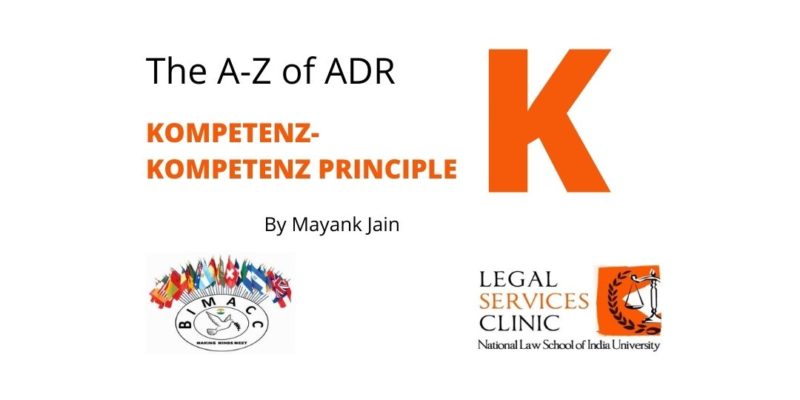
A-Z of ADR: Kompetenz-Kompetenz Principle
-Mayank Jain (V Year, NLSIU Bangalore)
The principle of kompetenz-kompetenz denotes the ability of arbitral tribunals to decide on their own jurisdiction to proceed with a case.[1] Essentially, this means the tribunal decides whether it can hear a case or not, without the intervention of a court. This principle is important in arbitration law as it affects the functioning of tribunals, and how long a case can take before the tribunal is able to decide on the matter. Recognising this principle by law gives the advantage of being able to carry out an arbitration proceeding in a swift manner and without courts interfering.
This principle is enshrined in the Arbitration & Conciliation Act, 1996 (“Act”). Section 16 of the Act states that arbitral tribunals have the ability to determine their own jurisdiction, i.e., whether they can hear the case or not. Further, Section 11 provides the Supreme Court or High Courts with the power to appoint arbitrators in certain situations (usually it is the parties who appoint the arbitrator, but if some procedure is not followed, a party can go to the court and ask them to appoint an arbitrator). However, Section 11(6A) (inserted by the Arbitration & Conciliation (Amendment) Act, 2015)[2] limits this power, allowing the courts only to look at whether an arbitration agreement between parties exists, and not whether the agreement is actually valid or not. Essentially, if an arbitration agreement exists, the arbitration tribunal has to be appointed and the tribunal itself will decide if it can hear the matter.
However, the history of this principle in India has not been smooth. In the past, the Supreme Court has taken a view that dilutes this principle. In 2005, in SBP & Co. v. Patel Engineering,[3] the Supreme Court extended its power under Section 11, while appointing an arbitrator, to look at not only just the existence of an arbitration agreement, but also decide whether the agreement is valid, whether the party making the request under Section 11 is a party to the agreement, along with whether the issues can be arbitrated upon. This was against the kompetenz-kompetenz principle as the court was doing the job of the tribunal. As stated above, the Act was amended in 2015 to add Section 11(6A), designed to prevent this situation.
A further decision of the Supreme Court in Booz Allen and Hamilton Inc. v. SBI Home Finance Ltd.[4] in 2011 clarified that in a petition under Section 11 of the Act, the Court cannot decide on the arbitrability of the dispute, and this can only be done by the tribunal itself. This was a reversal on the decision in Patel Engineering.
As stated above, the Act was amended in 2015 to add Section 11(6A), designed to prevent this situation. Following this, the Supreme Court in Duro Feguera v. Gangavaram Port Ltd.[5] applied Section 11(6A) strictly, looking at only the existence of the arbitration agreement.
However, another reversal of decision-making by the Supreme Court took place in United India Insurance v. Antique Art Exports,[6] where the Supreme Court held that an appointment under Section 11 is a judicial power, and hence it can look beyond just the existence of the arbitration agreement.
Since then, the Supreme Court has continued to be accepting of the kompetenz-kompetenz principle. In the most recent decision in 2019, in Uttarakhand Purv Sainik Kalyan Nigam Ltd. v. Northern Coal Field Ltd.,[7] the Supreme Court looked at Section 11(6A) and Section 16 and held that whether the matter can be heard or not must be decided by the tribunal itself. In this case, the issue before the Supreme Court was whether the arbitration claim was barred by limitation. The Supreme Court held that only the arbitral tribunal is competent to decide on this matter, and the Court can only intervene if the arbitration agreement itself is not in writing, or has been obtained by fraud or misrepresentation.
In 2019, the Act was amended, and Section 11(6A) was removed altogether.[8] Doubts were raised whether this means that the Supreme Court or High Courts, while appointing an arbitrator, can look beyond just whether an arbitration agreement exists, and can also look at the issues and pass an order on them. This would have resulted in arbitrations taking more time as every matter can go to court, and with Indian courts being quite slow, this would have impacted the main benefit of arbitration – being a fast and cheap procedure. However, this position as clarified by the Supreme Court in Mayavti Trading Pvt. Ltd. v. Pradyuat Deb Burman,[9] stating that the principle in Section 11(6A) will still apply. The provision was not deleted to go back to the law prior to the 2015 Amendment, but only as the appointment of arbitrators was to be institutionalised following the 2019 Amendment.
The net effect of this is that the Kompetenz-Kompetenz principle is still applicable in India, and arbitral tribunals can decide on their own jurisdiction. This will ensure that arbitrations proceed faster and with minimal interference from courts.
[1] Ashley Cook, ‘Kompetenz-Kompetenz: Varying Approaches and a Proposal for a Limited Form of Negative Kompetenz-Kompetenz’ 1(2) (2014) 17.
[2] Arbitration and Conciliation (Amendment) Act 2015, s 6(ii).
[3] SBP & Co v Patel Engineering (2005) 8 SCC 618.
[4] Booz Allen and Hamilton Inc v SBI Home Finance Ltd (2011) 5 SCC 532.
[5] Duro Feguera v Gangavaram Port Ltd AIR 2017 SC 5070.
[6] United India Insurance v Antique Art Exports (2019) 5 SCC 362.
[7] Uttarakhand Purv Sainik Kalyan Nigam Ltd v Northern Coal Field Ltd Special Leave Petition (C) No 11476 of 2018.
[8] Arbitration and Conciliation (Amendment) Act 2019, s 3(v).
[9] Mayavti Trading Pvt Ltd v Pradyuat Deb Burman Civil Appeal No. 7023 of 2019.
-Mayank Jain (V Year, NLSIU Bangalore)
Mayank Jain is a fifth-year student from the National Law School of India University (NLSIU), Bangalore.
BIMACC expresses its gratitude towards the author and to the members of the Legal Services Clinic, National Law School of India University (NLSIU) for their support in our collaborative efforts to promote ADR with this series titled “A-Z of ADR”. The purpose of this series is to increase the understanding of certain fundamental concepts of Alternative Dispute Resolution.
The Legal Services Clinic is a student-run committee that provides free legal services to the socially and the economically backward sections of the society who have difficulty accessing the judicial system. It also has a mandate of spreading legal awareness and providing free legal assistance to those who cannot afford it.
Website: www.legalservicesclinic.org/
Facebook: @legalservicesclinic
Email: lsc.nlsiu@gmail.com
Phone Number: 073586 73214
Disclaimer: The views and opinions expressed in this blog are those of the author and do not necessarily reflect the official policy or position of BIMACC, any of the members of the Board, or the empanelled neutrals. This blog is for informative purpose only and does not constitute legal advice in any manner whatsoever.
